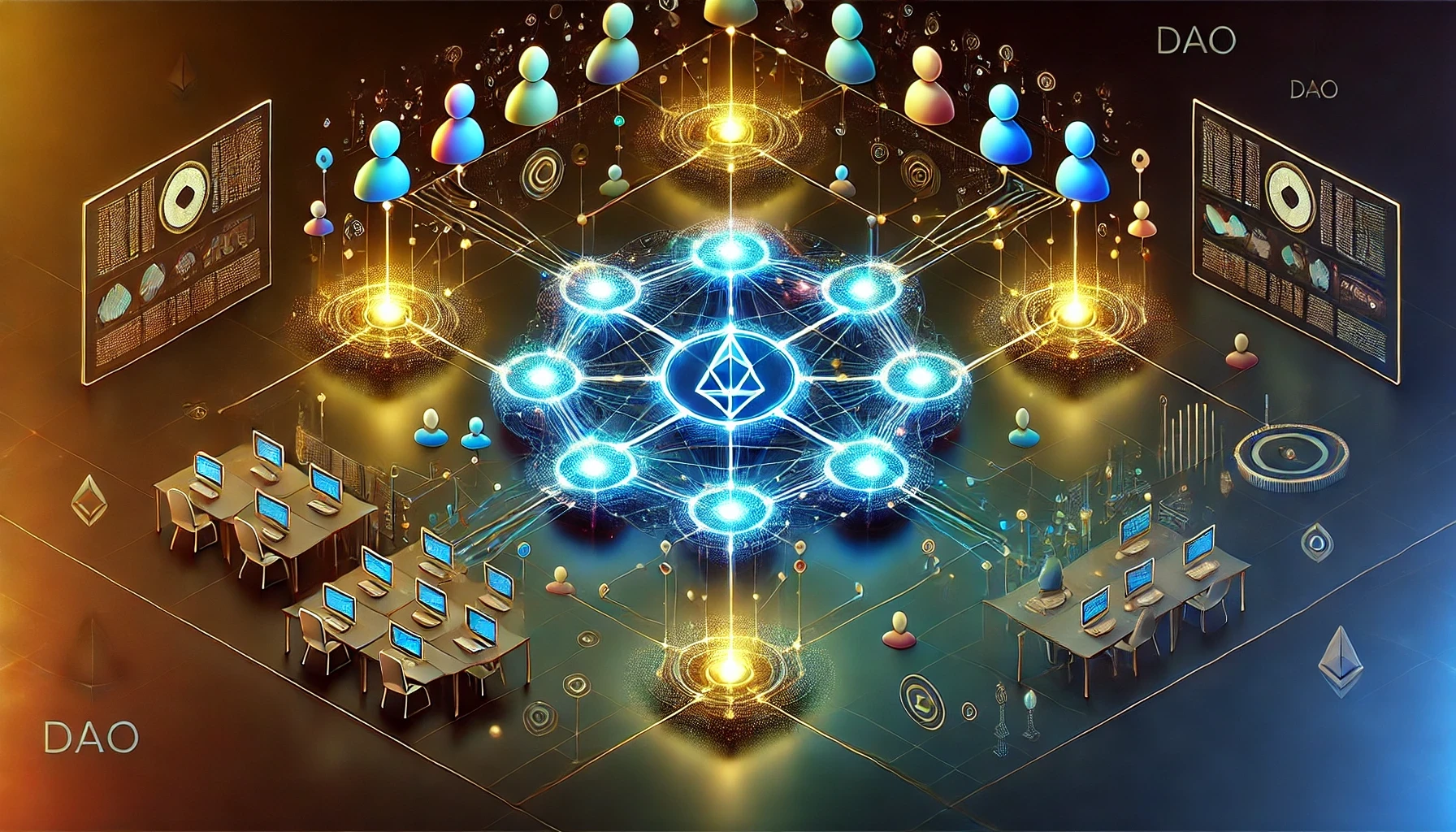1. What Is a DAO?
A Decentralized Autonomous Organization (DAO) is an organization governed by code and run by its members without centralized leadership. DAOs operate on blockchain networks and rely on smart contracts to automate decision-making and execution.
Key Features of a DAO:
Decentralized: Decisions are made collectively by members.
Transparent: Activities and votes are recorded on the blockchain.
Autonomous: Smart contracts automate rules and processes.
Example:
Uniswap DAO governs the popular decentralized exchange (DEX), allowing token holders to propose and vote on protocol updates.
2. How Does a DAO Work?
a. Smart Contracts
Smart contracts encode the rules of the DAO, automating processes like voting, fund allocation, and governance decisions.
b. Governance Tokens
Members hold governance tokens, which grant them voting power proportional to their holdings.
c. Proposals and Voting
Members submit proposals for changes or initiatives.
Token holders vote on these proposals, with the outcome determined by the majority or weighted vote.
d. Execution
Once a proposal is approved, the smart contract automatically executes the decision, ensuring trustless implementation.
3. Use Cases of DAOs
a. DeFi Governance
Many DeFi platforms use DAOs to manage their protocols, decide fee structures, and approve new features.
Example: Aave DAO oversees the Aave lending protocol, enabling token holders to vote on asset listings and interest rate policies.
b. Grant Funding
DAOs fund projects and initiatives through community-driven treasury management.
Example: Gitcoin DAO supports open-source development by allocating funds based on community votes.
c. NFT Collectives
DAOs pool funds to acquire and manage NFT assets collectively.
Example: PleasrDAO purchases high-value NFTs and fractionalizes ownership for its members.
d. Social and Creator DAOs
Communities form DAOs to collaborate on shared interests, ranging from art to activism.
Example: Friends With Benefits (FWB) DAO combines a social network with collaborative opportunities in Web3.
4. Benefits of DAOs
a. Decentralized Decision-Making
Power is distributed among members, reducing the risk of corruption or central authority abuse.
b. Transparency
Blockchain ensures all decisions, votes, and transactions are publicly recorded and verifiable.
c. Inclusivity
DAOs enable global participation, allowing anyone with internet access to contribute and vote.
d. Automation
Smart contracts eliminate the need for intermediaries, ensuring trustless execution of rules and decisions.
e. Alignment of Interests
Governance token holders are incentivized to make decisions that enhance the value and sustainability of the DAO.
5. Challenges of DAOs
a. Voter Apathy
Many token holders fail to participate in governance, leading to low voter turnout and decisions made by a minority.
b. Token Centralization
Wealthy individuals or entities can accumulate governance tokens, undermining decentralization.
c. Legal and Regulatory Uncertainty
DAOs often operate in legal grey areas, posing challenges for compliance and accountability.
d. Complexity
Technical barriers and complex governance structures can exclude less tech-savvy members.
e. Security Risks
Smart contract vulnerabilities can be exploited, leading to fund losses or governance manipulation.
Example: The 2016 DAO hack resulted in a $60 million theft due to a code vulnerability.
6. Examples of Successful DAOs
a. Uniswap DAO
Manages the Uniswap protocol, one of the largest DEXs, with governance decisions driven by its UNI token holders.
b. MakerDAO
Oversees the DAI stablecoin, enabling members to vote on collateral types and system parameters.
c. Aragon
Provides tools for creating and managing DAOs, making it easier for communities to implement decentralized governance.
d. ConstitutionDAO
Demonstrated the power of collective action by raising over $40 million to bid on a copy of the U.S. Constitution.
7. Future of DAOs in Blockchain Governance
a. Enhanced Governance Models
Hybrid models that combine token-weighted voting with reputation-based systems can address voter apathy and token centralization.
b. Legal Frameworks
Emerging regulations may provide clarity for DAOs, enabling them to operate within established legal boundaries.
c. Cross-Chain DAOs
Interoperable DAOs could function across multiple blockchains, expanding their reach and functionality.
d. DAO-as-a-Service (DaaS)
Platforms offering out-of-the-box DAO tools will make it easier for new communities to adopt decentralized governance.
Conclusion
DAOs are redefining governance by empowering communities to make decisions collectively and transparently. As the backbone of blockchain governance, they offer a glimpse into a future where decentralization, transparency, and community-driven decision-making become the norm.
While challenges like voter apathy and regulatory uncertainty persist, ongoing innovation and collaboration will continue to enhance the DAO ecosystem. Whether in DeFi, NFT management, or social networks, DAOs are set to play a pivotal role in shaping the decentralized future of blockchain.
